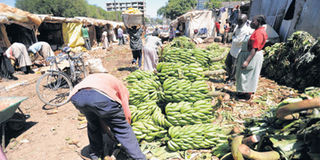7m Jua Kali workers to benefit from new retirement scheme

Bananas imported from Uganda on sale at Nakuru’s Wakulima Market. The World Bank and Retirement Benefits Authority have reached an agreement to boost the retirement scheme for millions working in the informal sector. PHOTO/SULEIMAN MBATTIAH
What you need to know:
- The success of the Mbao Pension plan formed to help people in the Jua Kali sector to contribute towards their retirement, has caught the eyes of the World Bank which is now keen to see the project benefit more small traders, Dr Odundo said.
- Membership also increased from 13,500 members to over 40,000 members, which, according to RBA, is a sign that the Jua Kali sector would perform far much better if more effort is put to encourage contributions into the schemes.
More than seven million Kenyans working in the informal sector are set to benefit from a new partnership between the World Bank and the Retirement Benefits Authority.
In an interview with the Nation Monday, RBA chief executive officer Edward Odundo said the new partnership will see the World Bank provide “a matching grant fund”, which will give Jua Kali workers equivalent of their monthly contributions towards retirement.
The incentive, meant to boost the uptake of retirement planning among millions of Kenyans working in the vibrant informal sector, will apply both to the two-year-old Mbao Pension plan and other private pension schemes.
“The partnership is expected to roll out from July and is targeting Jua Kali sector players, especially the young. It is basically meant to encourage more people to prepare for their days in retirement,” Dr Odundo said.
Keen on project
The success of the Mbao Pension plan formed to help people in the Jua Kali sector to contribute towards their retirement, has caught the eyes of the World Bank which is now keen to see the project benefit more small traders, Dr Odundo said.
The project will initially involve setting up of different control groups that will benefit from the matching grant funds, after which the project will be rolled out countrywide and in other East African countries depending on its uptake.
Data released by RBA in February shows that retirement savings for informal sector workers held by the authority had doubled over a period of six months to reach Sh40.5 million.
The sector is among the biggest source of livelihood in the country, employing millions of Kenyans.
Membership also increased from 13,500 members to over 40,000 members, which, according to RBA, is a sign that the Jua Kali sector would perform far much better if more effort is put to encourage contributions into the schemes.
The success of the Mbao scheme, run by The Co-op Trust Investment Services, has seen other countries in the region look into the possibility of launching similar programmes.
At its inception in 2011, the scheme had 11,000 members recruited in its pilot phase.
Biggest employer
RBA and trustees of Mbao said they are currently in talks with their counterparts in South Africa to help them set up their own pension fund for the informal workers.
Currently, there are more than 200,000 pensioners in the country with about 80 per cent of these in formal employment.
The number is expected to grow by 10 per cent annually from 2015.




